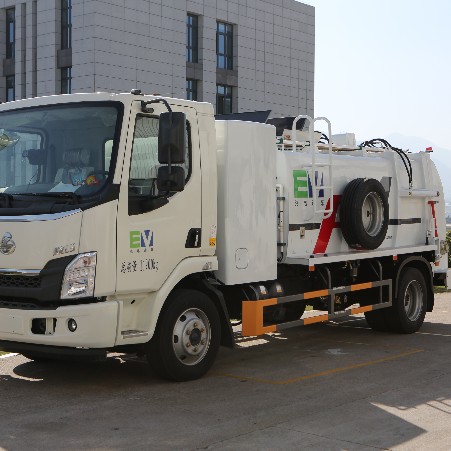In a world where sustainability and environmental consciousness are increasingly vital, the concept of food waste trucks has emerged as a practical and impactful solution. These specialized vehicles are designed to address one of the most pressing issues of our time: food waste.
Food waste trucks are a relatively recent innovation, combining modern technology with sustainability efforts. These trucks are specifically engineered to collect, transport, and often help process food waste from various sources, including households, restaurants, supermarkets, and food processing plants.
What is a Food Waste Truck?

A food waste truck is a vehicle designed specifically for the collection and transportation of food waste. Unlike traditional garbage trucks, food waste trucks are equipped with features that cater to the unique requirements of handling organic waste. These may include sealed compartments to prevent leaks and odors, specialized compaction systems to maximize space efficiency, and sometimes even refrigeration units to prevent decomposition during transit. The primary goal of a food waste truck is to transport food waste safely and efficiently to facilities where it can be processed and repurposed.
How Food Waste Trucks Operate
The operation of food waste trucks involves several steps, each crucial for ensuring that food waste is managed effectively.
- Collection: Food waste is collected from designated bins at various locations such as homes, restaurants, and supermarkets. This is often done on a scheduled basis to ensure regular removal of waste.
- Transportation: Once collected, the food waste is transported to processing facilities. The trucks are designed to minimize odor and leakage during this journey.
- Unloading: At the processing facility, the food waste is unloaded. Some trucks are equipped with tipping mechanisms to facilitate this process.
- Cleaning: After unloading, the trucks are thoroughly cleaned to prevent contamination and maintain hygiene standards.
The Role of Food Waste Trucks

The role of these trucks is multifaceted. They reduce the environmental impact of waste, support recycling efforts, and can even contribute to the production of compost or bioenergy.
- Reduction of Landfill Use: By diverting food waste from landfills, these trucks help reduce the volume of waste that contributes to methane emissions.
- Resource Recovery: Food waste can be repurposed into valuable products such as compost, animal feed, and bioenergy. Food waste trucks ensure that waste reaches facilities where these transformations can occur.
- Public Awareness: The presence and operation of food waste trucks can also raise awareness about the importance of food waste management among communities.
Processing Food Waste
Once collected, the food waste is processed in various ways. It can be turned into compost, which enriches soil, or anaerobically digested to produce biogas, a renewable energy source.
- Composting: Organic waste is broken down through aerobic decomposition to produce nutrient-rich compost. This compost can then be used to enrich soil in agriculture and gardening.
- Anaerobic Digestion: In this process, microorganisms break down food waste in the absence of oxygen, producing biogas (which can be used as a renewable energy source) and digestate (a nutrient-rich residue that can be used as fertilizer).
- Animal Feed: Certain types of food waste can be processed and converted into animal feed, reducing the need for traditional feed resources.
- Bioenergy Production: Advanced technologies can convert food waste into bioenergy, providing a renewable source of power and reducing reliance on fossil fuels.
The Future of Food Waste Trucks

The future of food waste trucks is bright and full of potential. Innovations in technology could lead to more efficient collection methods, better processing techniques, and even smarter trucks that can sort and process waste on the go.
- Enhanced Efficiency: Future food waste trucks may incorporate advanced sensors and AI to optimize collection routes, reduce fuel consumption, and minimize emissions.
- Better Integration with Smart City Infrastructure: As cities become smarter, food waste trucks could integrate with municipal waste management systems, enabling more efficient coordination and real-time monitoring.
- Electric and Hybrid Models: To further reduce the environmental impact, the adoption of electric and hybrid food waste trucks is likely to increase, offering cleaner alternatives to traditional diesel-powered vehicles.
- Public Participation Programs: Education and incentive programs could be linked with food waste truck operations to encourage greater public participation in food waste reduction efforts.
Food waste trucks are an essential component of modern waste management strategies, helping to address the critical issue of food waste. By efficiently collecting and transporting organic waste to processing facilities, these trucks contribute significantly to environmental sustainability and resource recovery. As technology advances and awareness grows, the role of food waste trucks is set to become even more impactful, paving the way for a greener, more sustainable future.
FAQs
What types of food waste can be collected by food waste trucks?
Food waste trucks can collect a wide variety of organic waste, including fruit and vegetable scraps, meat and dairy products, bread and grains, coffee grounds, and even spoiled or expired food items.
How can I participate in food waste collection programs?
Participation typically involves separating your food waste into designated bins provided by local waste management authorities. Check with your local municipality for specific guidelines and collection schedules.
Are food waste trucks environmentally friendly?
Yes, many modern food waste trucks are designed to be environmentally friendly, incorporating features like sealed compartments to prevent leaks and odors, and some are even transitioning to electric or hybrid models to reduce emissions.
What happens to the food waste after it is collected?
After collection, food waste is transported to processing facilities where it can be composted, anaerobically digested, converted into animal feed, or used for bioenergy production.
Can food waste trucks handle large volumes of waste?
Yes, food waste trucks are designed to handle significant volumes of waste. They are equipped with compaction systems to maximize capacity and ensure efficient transport to processing facilities.






